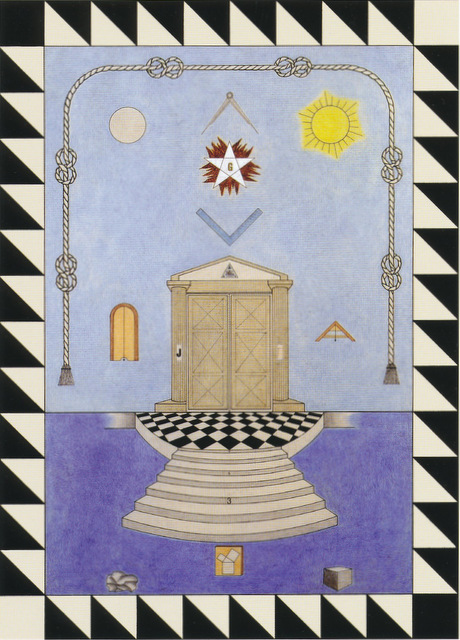Freemasonry on the Continent of Europe.
Freemasonry appeared in Paris in 1726 and spread throughout Europe, particularly in our part of the world, at the time known as the Austrian Netherlands. In 1733 the Grand Orient of France was founded with the Duke of Chartres (later Philippe-Egalité) at its head; and in 1738, a Grand Lodge was established in France, the two bodies coexisting up to the time of the French Revolution. From then on, a certain tendency arose in the Freemasonry of the “Latin” world: a love of rhetoric and debate often led to favouring discussion over the work of initiation.
These Lodges were first and foremost social places of friendly discourse, eloquence and pleasures of the table. They also played a modest role in spreading the ideas of the Enlightenment though not, it has to be said, in any major way. It is wrong to think of their activities as one of the causes of the French Revolution. This myth, which arose in the 19th Century, conjured up by a fiercely anti-Masonic author, Abbot Barruel, was later taken up, strangely enough, by members of the Grand Orient of France, caught up in the throes of political fervour.
In fact, its own membership, coming from all three social classes, meant that Freemasonry was in no position to take up arms against the traditional class structure without bringing about its own disintegration and it never even thought of doing so. Many documents show how neutral Freemasonry remained during the French Revolution, and if there were Masons among the advocates for the Guillotine, there were even more who fell victim to it. In fact, these events were to prove almost fatal to the Order in France. In 1792 all Lodges were closed down and but for the reaction that occurred during the month of Thermidor, this might have been permanent.
The Empire period marked a major turning point in the development of Masonry in France. During this period it became a compliant tool of the authorities. The nobility and clergy of the old regime were replaced by imperial civil servants, army officers and captains of commerce and industry. The Grand Orient of France, a centralized regulating power, became an instrument of the prevailing political order.
The fall of the Empire meant the disappearance of this cooperation and the brutal decline of an institution far too tied to the regime; but this loss of political influence awoke in some the desire to regain it and persuaded them to intervene more openly as Masons in political life. In France this development spelled the end of traditional Freemasonry and the rise of an organization aimed at spreading a doctrine of social progress based on fraternity between men, rejection of former beliefs and the supremacy of reason, something that the Masonic author Jean Baylot termed La Voie Substitué or alternative path.
This turn of events was largely made worse by conflict with the Catholic Church, which had, as early as 1738, condemned a society that admitted members without distinction of faith and making religious tolerance its main principle. This first condemnation had had hardly any effect, but continual and vicious repetition meant that most Roman Catholics stayed away from Lodges where before they had been quite numerous. Lodges became havens to those for whom the battle against the Church seemed like the duty of every man who prized freedom.
These two factors, the nostalgia for power and refusal of the Roman Church’s domination, were determining elements and gave irregular Continental masonry the character it still retains. Within it, radicalisation of ideas in the latter half of the 19th Century was to lead to a complete reform of the the institution: debates about religion and politics were now permitted in Lodges, and any need to believe in God and references to the Deity in the rituals was eliminated; in addition masonry was opened up to women by the creation of a mixed organisation, the Droit Humain.
In Latin countries, conflict between Catholics and free-thinkers resulted in many Freemasons becoming members of centre-left parties – where they often had considerable influence – and in the politicising of masonic bodies. The members of these organisations were encouraged to adopt a stance on the issues of the time (education, separation of civil and Church powers, religious congregations, Vatican influence) and some more or less openly supported causes defended by parties opposing Catholic interests. There was also a tendency to dissolve the dividing lines between masonic bodies and political parties (Italian republicans and liberals, Belgian liberals and above all, French radicals).
Since 1945, political developments and the increased role of trade unions, left-wing parties and the extreme left have completely overturned caused the earlier situation. The French Radical Party has lost practically all its influence and the Belgian Liberal Party has evolved considerably. Nevertheless, the earlier ties between politics and Freemasonry have left their marks on irregular masonry. In France, for example, the Grand Orient retains a lively interest in public life, its assemblies often given over to issues of a political, social and economic nature on which its Lodges have been asked to debate beforehand; and at times it feels obliged to adopt a position on the general problems of society. In our country, many members of the Grand Orient of Belgium still show a fierce and deep-rooted anti-Catholicism, often entailing an aversion to any mention of the Deity.

R.L. Geoffroy de Saint-Omer, n° 18 – O. Bruxelles